Free Will
Does man truly possess free will?
7/20/20219 min read
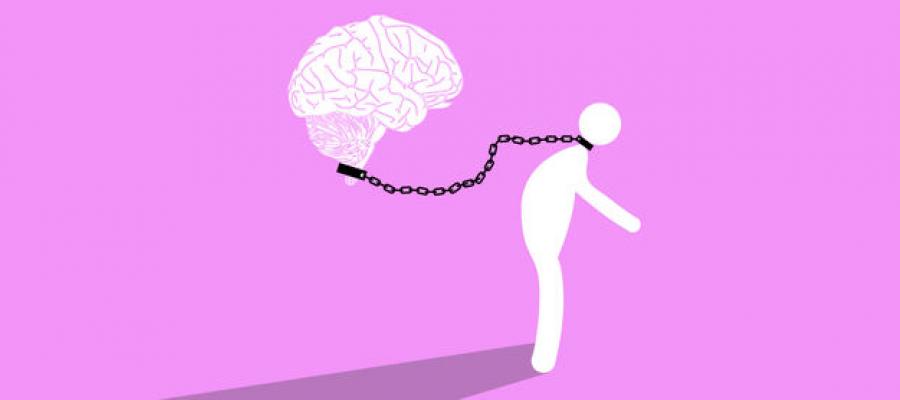

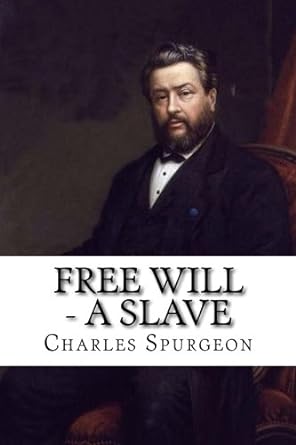

Free Will - A Slave
4.8 out of 5 stars 40 ratings 4.6 on Goodread 36 ratings
"And ye will not come to me, that ye might have life." - John 5:40
This is one of the great guns of the Arminians, mounted upon the top of their walls, and often discharged with terrible noise against the poor Christians called Calvinists
One of the key issues between Calvinists and Arminians is how they view 'The Will Of Man'.That man has a will is not a point of contention,but the state of man's will(after the fall)is at the heart of where they differ in their views.Martin Luther was mightily used of the Lord and he considered his most important writing to be 'The Bondage Of The Will'.
Encouraging to surrender to Jesus Christ completely.
I enjoyed reading this eBook - more than that gives me more understanding of God’s Sovereign Grace and the nothingness of man. It is very encouraging and uplifting.
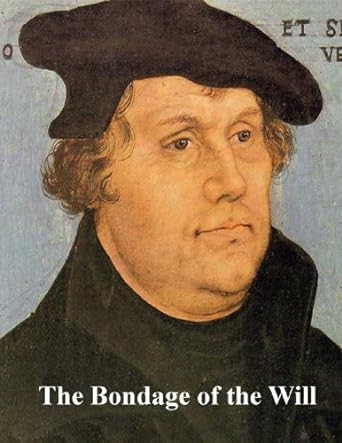

The Bondage of the Will (Annotated) by Martin Luther
- Annotated with suggested futher readings and inline links to additional web content.
On the Bondage of the Will (Latin: 'De Servo Arbitrio', literally, "Concerning Bound Choice"), by Martin Luther, was published in December 1525. It was his reply to Desiderius Erasmus's De libero arbitrio diatribe sive collatio or On Free Will,....
4.6 out of 5 stars 361 ratings 4.1 on Goodread 8,300 ratings
The Bondage of the Will is necessary reading for anyone seeking to understand the roots of Protestant theology.
i wouldnt recommend this version to those who havent a very good hold of english because its quite a hard read.
Every "believer" should read this. Incredibly important and the basis for understanding the doctrine of grace and Calvinism. Read it
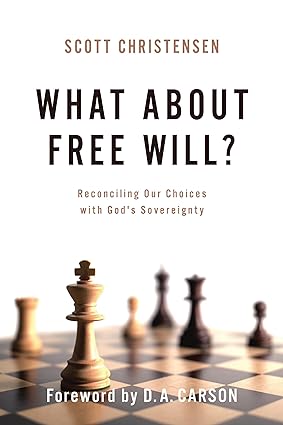

What about Free Will?: Reconciling Our Choices with God's Sovereignty
4.5 out of 5 stars 87 ratings 4.4 on Goodreads 123 ratings
Christensen explains two views that acknowledge God's sovereignty and its relation to human responsibility: compatibilism and libertarianism....
I have been researching, reading, and following the Calvinist-Arminian debate for many years and this is one of the best books I have read on the subject—well researched and argued.
This book has been such a blessing and satisfying. You will not be disappointed!
This should be required reading for those not going to Bible college or seminary. It is teaching that is lacking in the evangelical church.
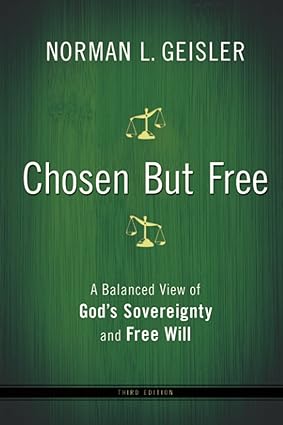

Chosen But Free: A Balanced View of God's Sovereignty and Free Will
4.6 out of 5 stars 318 ratings 3.3 on Goodreads 598 ratings
The Reformed movement has gotten younger and more outspoken since Chosen But Free was published more than ten years ago, making the topic of divine election one of utmost importance to the church today....
Norman Geisler's `Chosen but Free' is a popular level discussion of the relationship between divine sovereignty and free will.
This book is the best and makes the sense of all the positions
Great teaching on how it is possible to embrace the...
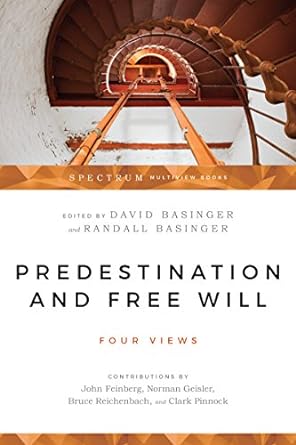

Predestination & Free Will: Four Views of Divine Sovereignty & Human Freedom
4.2 out of 5 stars 68 ratings 3.5 on Goodreads 151 ratings
This question has bothered Christians for centuries. And answers have covered a wide spectrum. Today Christians still disagree. Those who emphasize human freedom view it as a reflection of God's self-limited power. Others look at human freedom in the order of God's overall control.
A must for any student of the Scripture who wants to understand the on-going battle of "Free Will" or "Bound Will."
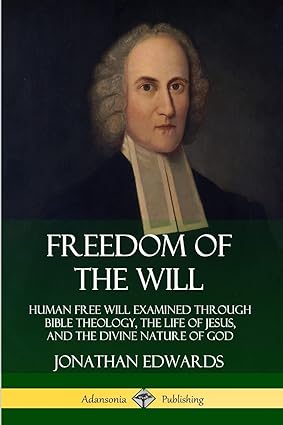

Freedom of the Will: Human Free Will Examined Through Bible Theology, the Life of Jesus, and the Divine Nature of God
Jonathan Edwards was a leading Christian revivalist of the 18th century: in this book, he explains how God repairs and redeems the flaws of humankind by being an extension of the human being’s free will.
4.6 out of 5 stars 20 ratings
A superb and evocative treatise, Edwards draws on his knowledge of both theology and philosophy to deliver a convincing examination of the human soul.
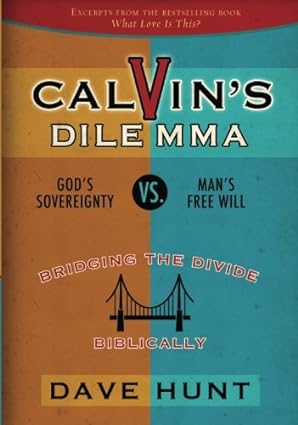

Calvin's Dilemma: God's Sovereignty vs. Man's Free Will
4.5 out of 5 stars 39 ratings
Sovereignty versus Free Will. Can the centuries-old divide be resolved—biblically? Drawn from Dave Hunt’s masterful work on the subject, What Love Is This? Calvinism’s Misrepresentation of God, this long-awaited installment in the “easier-to-read” paperback series provides an invaluable and highly accessible examination of one of the most hotly-debated topics among evangelicals today.....
Dave Hunt crushes Calvinism with scriptures. I was leaning towards the reformed side but after reading this book my understanding is better and now back towards the middle ground. Can't wait to read the scriptures with fresh eyes
I appreciate Dave Hunt's research of a doctrine that is, in my opinion, not consistent with the plain truths of the Bible. "All through the Bible, man is called upon to choose between time and eternity, between Satan and God,
The concept of "Free will" suffers no less with regard to the misunderstandings of predestination, total depravity, Calvinism and complementarianism.
The discussions around free will can become entangled with various theological and philosophical viewpoints, leading to complex debates. Predestination, total depravity, Calvinism, and complementarianism each present distinct perspectives that can influence how free will is understood.
In Calvinism, the idea of predestination asserts that God has predetermined the fate of individuals, which can seem to conflict with the concept of free will. Total depravity, another aspect of Calvinist theology, suggests that human nature is inherently corrupt due to the Fall, impacting one's ability to freely choose good over evil.
Complementarianism, a belief that men and women have different but complementary roles, may also intersect with discussions of free will, especially in terms of how individual agency is perceived within specific social or religious contexts.
The challenge lies in reconciling these various perspectives with the notion of free will. Some argue that free will and predestination can coexist, suggesting that God's foreknowledge of choices doesn't necessarily negate personal agency. Others debate whether true free will can exist within a framework that includes predetermined outcomes or a pre-existing state of depravity.
It's a deeply nuanced discussion that touches on fundamental aspects of human existence, spirituality, and the nature of choice. Different interpretations and beliefs about these concepts can significantly shape one's understanding of free will and its compatibility with various theological doctrines.
What do we mean by free will?
The idea of free will generally refers to individuals ability to make choices and decisions independently without being influenced by factors or predetermined circumstances. It suggests that people have the freedom and capacity to decide their actions, thoughts and beliefs based on their reasoning or desires.
The concept of will encompasses the notion that humans can carefully consider options and choose a course of action that is not solely determined by outside forces or predetermined factors. It implies that individuals have some level of control, over their actions and can be held accountable for the outcomes resulting from those actions.
However discussions about free will often venture into religious and scientific realms where the extent of this freedom is questioned. Some argue that free will may be an illusion due to biases, societal conditioning, genetic tendencies or deterministic views of how the universe operates.
In summary free will remains an multifaceted concept to interpretation and debate, across various fields. The understanding of free will can vary depending on religious psychological and scientific perspectives.
Eph 2:5 Even when we were dead in sins, hath quickened us together with Christ, (by grace ye are saved;)
Eph 2:8 For by grace are ye saved through faith; and that not of yourselves: it is the gift of God:
Free will, human nature and God
Total or libertarian free will? "The power of contrary choice"
That's a compelling perspective. The concept of libertarian free will, which suggests absolute free will where individuals can act independently of any internal or external influences, does face challenges when considering the idea of choosing against one's nature.
Many argue that our choices are often influenced by our nature, which includes our inherent dispositions, experiences, genetics, and environment. From this standpoint, choosing against one's nature might seem improbable or perhaps even impossible, as our nature significantly shapes our preferences, inclinations, and decision-making processes.
For instance, someone's temperament, moral compass, or deeply ingrained beliefs might strongly influence the choices they make, making it challenging to act in complete contradiction to those foundational aspects of themselves.
This viewpoint aligns with the deterministic aspect of human nature, suggesting that while individuals have the capacity to make choices, these choices are heavily influenced, if not entirely determined, by factors such as upbringing, genetics, societal influences, and personal experiences.
In essence, the idea of choosing against one's nature raises thought-provoking questions about the extent of free will and the profound impact that one's nature exerts on the choices they make.
A neutralized will still has some massive difficulties.
The concept of a neutral or completely unbiased will faces significant challenges. The idea of a truly neutral will suggests that an individual can make decisions without any influence or inclination toward one choice or another. However, several complexities arise when considering this notion:
Nature and Nurture Influences: Our upbringing, experiences, genetics, and environment shape our preferences, beliefs, and inclinations. These factors heavily influence decision-making, making it challenging to achieve a state of complete neutrality.
Biases and Subconscious Influences: Human decision-making often involves subconscious biases and influences that we might not consciously recognize. These subconscious factors can sway our choices without our awareness, making it difficult to achieve a completely neutral will.
Information Processing Limitations: The sheer volume of information available when making decisions can overwhelm the capacity of an individual's cognitive processes. Filtering this information without any inherent biases or inclinations is a daunting task.
Paradox of Choice: When faced with numerous options, individuals might experience decision paralysis or struggle to remain neutral due to the overwhelming number of possibilities.
Emotional and Psychological Factors: Emotions, desires, fears, and motivations play significant roles in decision-making. Achieving neutrality might be challenging when emotions or deeply ingrained motivations come into play.
Acknowledging and understanding these challenges highlights the complexity of achieving a truly neutral will. The various influences on human decision-making suggest that complete neutrality might not be practically achievable, raising questions about the nature and extent of human agency and free will.
Total free will can not exist either in the belief of evaluation or creation; both have restraints. Free will cannot be applied to any living creature outside of its own nature e,g; a human cannot use his will to fly, to breath under water, to choose to be born, he cannot exercise his will to what perents he will have or gender. He cannot choose anything outside of his nature. God is outside of mans nature because of his fallen state, so he cannot choose God, Libertarian free will makes it only worse.
A neutralized will amounts to your absence from the choice itself.
The idea of a neutralized will implies a state where an individual's absence or lack of influence is present in the decision-making process. In essence, being entirely neutral might equate to a passive state where one doesn't actively participate or contribute to the choice being made.
It suggests that true neutrality might lead to a lack of engagement or involvement in the decision, as being entirely neutral might result in no inclination or preference toward any option presented. In such a scenario, the decision might potentially default to external factors or random chance rather than an active exercise of personal agency or choice.
This idea aligns with the notion that personal engagement and active involvement are inherent to decision-making processes. When an individual remains entirely neutral, it implies a passive stance that might remove them from the decision-making equation altogether.
However, achieving absolute neutrality in decision-making is challenging due to the inherent biases, inclinations, and influences that shape human choices. In practice, the absence of personal involvement or influence in a decision might not be feasible, given the complexity of human nature and the myriad factors that contribute to decision-making.
